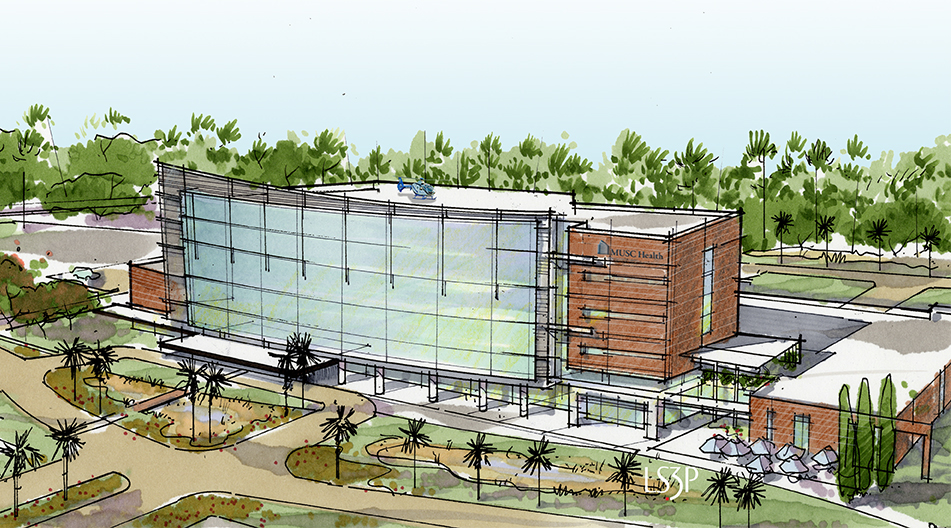The master-planned Nexton community will soon become a medical destination for Berkeley County.
The Medical University of SC has proposed a $130 million hospital within the Summerville community. The 128-patient bed facility will include four operating rooms, eight labor and delivery rooms, diagnostic testing and imaging, and emergency services, MUSC Health Chief Strategy Officer Sarah Bacik said.
“A large percentage of our current patients originate from Berkeley County, and this is going to really allow our patients to have access within our communities,” Bacik said. “It’s not a surprise to anyone that the growth has outpaced some of the infrastructure.”
MUSC has asked the state for approval to build the community hospital through a certificate of need. The build is expected to take two and a half years.
Nexton’s Vice President of Operations Brent Gibadlo said a hospital offers a service to the surrounding areas and residents because health care options have become a growing priority for homebuyers.
“There are certain basic things that are important for everyone that don’t change,” he said. “Certainly good schools if people have children and then good health care options. So having a world-class hospital in close proximity is always a wonderful compliment to a community.”
Downtown Charleston’s MUSC campus will remain the hub for the educational hospital, while the Nexton campus will book end it with satellite campuses and ambulatory services in between, Bacik said.
“We’re full downtown, and we need to make sure that we can continue to have access to those more acute patients,” Bacik said. “It’s really about getting the patients the right level of care at the right place.”
The need for a community hospital in Berkeley County is critical, said Dr. Dave Zaas, CEO of the Charleston division of MUSC. The hospital’s co-location in Nexton will help with the area’s continued growth.
“That is a lot of our strategy not just in tri-county but around the state,” he said. “Not only delivering the highest quality … but more convenient and ideally at a lower cost. I think that drives our ambulatory growth as well as our statewide strategy.”
Gibadlo said Nexton is just starting to explore the possibilities with MUSC and its idea of community health care, of being more proactive and going out into the community to initiate health and wellness programs. Preventative care could then decrease the need for hospital visits.
“We’ve had conversations with MUSC on how to incorporate some of those programs into Nexton,” Gibadlo said. “That’s everything from community gardens to community fitness programs to even potential opportunities for some of the coordination between MUSC and some of the companies at Nexton.”
Other suggestions include incorporating companies’ health care programs through MUSC and creating wellness programs employees can participate in.
Bacik is already excited for both caregivers and patients because she believes the best care is delivered conveniently to patients, many of whom come from across the state.
“A lot of our patients and staff travel to the peninsula today to receive care or to care for our patients … so if they could receive care 30 minutes closer, that’s a benefit for the communities as well,” Bacik said.
Gibadlo is going on 13 years at Nexton and said there is has another 13 or 14 years left in the business plan. He still remembers those early years, though, sitting in a Welcome Center trailer praying that builders and homebuyers would think outside the box.
Convincing people to give Nexton a chance was hard a decade ago given the location.
Over time, Gibadlo has found that if he pushes the envelope to create value, the innovation is well-received.
“I think the potential for Nexton is really evolving continuously. What we used to think was possible we’ve exceeded now. Maybe we can take it another step,” he said. “A hospital was something we only dreamed about 10 years ago. Now that’s happening.”
Nexton now receives calls almost daily from groups, retailers and home builders who want to create something exciting at the community. Gibadlo said the biggest challenge is prioritizing. If he reacts to every call, he risks losing focus of the long-term vision that Nexton is systematically moving through.
“At the same time, you have to be flexible enough that if you get a call, like from MUSC, you change track a little bit because that’s a great opportunity,” he said.
A community with a master plan allowed Gibadlo and his team to be deliberate about adding a hospital. They could look at the map of the 5,000 acres to find a plot that was accessible, wouldn’t disrupt homeowners with traffic and had surrounding space for businesses the hospital could bring in. Gibadlo believes they will come.
As an educational institution, MUSC’s research and development could lead to job opportunities and potential spin-off businesses, he said.
Together, Gibadlo and his team’s vision for Nexton stem from a love for the region. He knows, however, that with any growth, there will inevitably be challenges. The objective then is to figure out how to make those obstacles positive.
“We look at it and say hey, we can create this employment center in the Charleston region, take some of the pressure off downtown, 526, everyone commuting and bring some of the great things that people love about this region from a quality of life and bring them to another location that can spread them out a little bit,” he said. “Maybe we can play a small role in helping this region continue to be a great place to live. At the heart of it, that’s what motivates us every day.” (Credit: Charleston Regional Business Journal)
